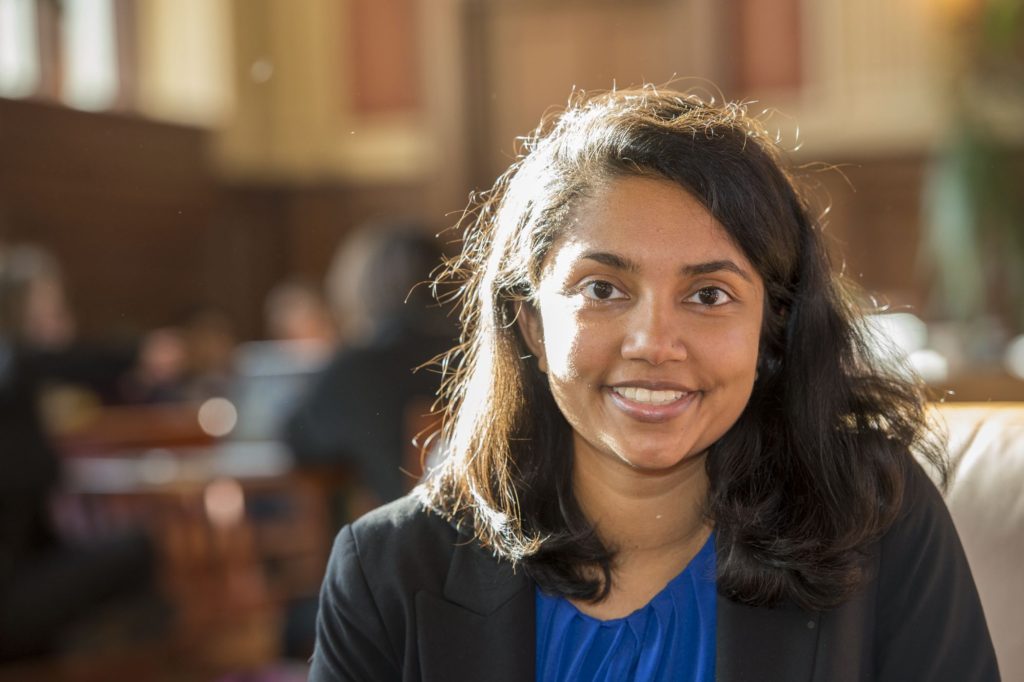
From teaching women self-defense to singing to hospital patients, Pooja Jairam believes in empowering people. (Photo: Joe Angeles/Washington University)
Pooja Jairam has an extraordinary drive to help people in need, and when she sees an opportunity to do so, no amount of difficulty can stop her. This drive was the reason she became proficient in women’s self-defense techniques.
“One day, I picked up a newspaper and read about a really horrendous rape that had occurred in Delhi, India,” she said. “After learning about this, I couldn’t just sit there. I needed to do something about it.”
She sought the advice of chemistry teacher Gina Frey, the Moog Professor of STEM Education in Arts & Sciences. “With her guidance, I developed a curriculum to teach myself self-defense so I could go to India and teach women there how to protect themselves.”
With a loan from her parents (that she’s already repaid), Jairam traveled to India that following summer and taught these critical skills to about 20 women. Her goal is for these women to teach others, who will then teach others, so that women have a better chance of preventing attacks.
“While working with these women, I began to understand the impact of assault and rape on their physical and psychological health, which motivated me to work to end these atrocities,” she said. “They should never occur, and it’s a simple matter of equipping women with the basic skills they need to protect themselves.”
Since her high school days in Salt Lake City, when Jairam decided her talents would be best put to use in a medical career, she has reached for the stars, challenging herself to get all she can out of life. That’s why she chose Washington University in St. Louis, and why she applied and was accepted here as a University Scholar. This program provides students with outstanding academic records and demonstrated leadership skills an early orientation to a medical career.
As a December graduate who is finishing her matriculation in just three-and-a-half years with a degree in biology in Arts & Sciences, it may appear that Jairam’s time here was all work and no play. In fact, she is a well-rounded individual who spends time hiking, playing music and enjoying the company of her friends.
She credits having this balanced approach to life to her adviser, Joan Downey, MD, assistant professor of pediatrics in the School of Medicine. Early on, Downey impressed upon her advisee the importance of balance, which, as Jairam states, is needed, “not just to handle the stress and workload, but also to become a better doctor.”
Among the long list of extracurricular activities in which Jairam has participated include:
- singing and playing piano as a program leader with “Cadence with Care,” the Campus Y program that brings together student musicians and singers to perform for patients;
- teaching self defense techniques at The Women’s Safe House;
- feeding her intellectual curiosity as a member of the JCUBES executive board, a journal club for science-oriented undergrads interested in expanding their knowledge outside the classroom;
- helping chemistry students develop confidence in their problem-solving skills through Peer-Led Team Learning;
- actively participating as an executive board member of Alpha Epsilon Delta, the university’s pre-health society, and developing programs that address timely issues in health care; and
- visiting hospital patients and listening to their stories by volunteering at the Siteman Cancer Center and at St. Louis Children’s Hospital.
All of these experiences — whether in the lab, the classroom, the hospital, student organizations, or the shelter — have taught Jairam the significance of learning a person’s story, not only to connect with others but also as a means of helping decipher a diagnosis in her future medical career.
So how does she manage to fit all her work and interests into a normal day? With a light laugh, she said, “I just try to schedule everything, even sleep. I make sure I get eight hours of sleep.”
Getting enough sleep isn’t impressive, Jairam said, just necessary: “I have so much I want to do and I need the energy to do everything.”
As she waits to hear from medical schools, one thing is clear: wherever Jairam goes, that community will surely benefit from her presence.
–Barbara Rea